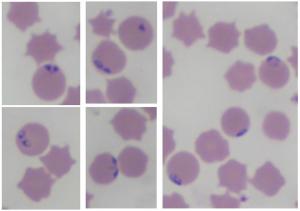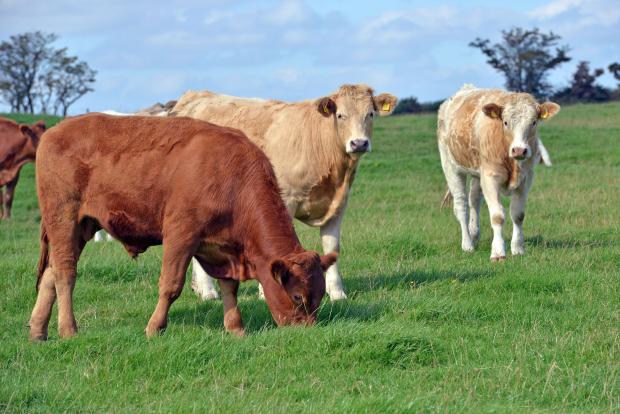Redwater, the common name for babesiosis, is a parasitic infection endemic in westerly areas of Northern Ireland with cases of the disease mainly seen in naïve animals during the Spring and Autumn months.

A three-year-old beef cow was presented to Stormont VSD at the beginning of January, following sudden death while grazing near Strangford Lough in Co. Down. The cow had a tick burden and was diagnosed with babesiosis, initially on positive blood smear and then by positive PCR for Babesia divergens. This was the first case of babesiosis identified in Stormont VSD for 5 years and was particularly significant giving the unusual seasonal presentation of the disease.

Ticks have an environmental requirement for high humidity, which limits their activity to woodland, rough hill grazing, overgrown pasture and waterlogged low-lying areas. As the infection relies on ticks, there is traditionally a peak in the number of cases, associated with ticks becoming active, in April to June and August to October. From recent research in Ireland and the UK, the levels of babesiosis have decreased, however there have been reports of Babesia cases being detected in the winter. This finding is attributable to the effects of global warming, with 2023 being the warmest year on record for NI, with few episodes of freezing temperatures having occurred this winter.
Bovines less than 9 months of age have an apparent immunity to the disease and if they are infected during this period, their immunity will persist provided they are repeatedly exposed to infection as adults. This is why cattle in areas endemically infected, and with a high tick burden, have few clinical cases in resident animals, with most cases occurring in brought-in animals. However there have been reports of babesiosis in calves under this age.
Babesiosis is a significant disease due to its morbidity and in some cases mortality for naïve animals, however even in endemic areas it can still affect fertility and productivity. The characteristic finding in cases with this disease, and why it is colloquially termed ‘Redwater’, is the red to ‘port wine’ coloured urine. This is caused by haemoglobinuria, following the release of haemoglobin when infected RBCs rupture. Other clinical signs in the acute phase include fever, increased respiratory rate and pipe-stem diarrhea, while chronic cases progress to constipation, anaemia, low body temperature and jaundice. However, recent observations by farmers and vets note that the most common clinical sign detected on-farm is constipation.
Diagnosis of babesiosis on-farm is often based on clinical signs and history of recent movement into a known infected area, however blood smear analysis and PCR testing can be undertaken for a definitive diagnosis. Treatment may not be required in mild cases if the level of parasitism is low, and animals that recover are infected for a variable time with no clinical signs. However, for the more severely affected animals, treatment involves chemotherapy with Imidocarb and an ectoparasitic, and perhaps blood transfusions and other supportive care. Treatment is best made on a farm- and animal-specific basis, in consultation with your vet. To prevent cases, it is important to identify areas most at risk and avoid grazing susceptible naïve cattle there. Tick control is also important including, if appropriate, field drainage, clearing overgrowth and the use of long acting ectoparasitic treatment effective against ticks. It may be advisable to discuss with your vet about prophylactically treating suspected naïve animals moving into an infected area.
This is a reminder to vets and farmers to be aware of the changing annual and geographic activity of ticks, and to keep ‘Redwater’ on your differentials list in any tick-associated areas in Northern Ireland at any time of the year. Acknowledgement and thanks to our colleagues in Department of Agriculture, Food and Marine for running the PCR analysis to confirm babesiosis.
Notes to editors:
AFBI’s Vision is “Scientific excellence delivering impactful and sustainable outcomes for society, economy and the natural environment”.
AFBI’s Purpose is “To deliver trusted, independent research, statutory and surveillance science and expert advice that addresses local and global challenges, informs government policy and industry decision making, and underpins a sustainable agri-food industry and the natural and marine environments”.
AFBI’s core areas:
- Leading improvements in the agri-food industry to enhance its sustainability.
- Protecting animal, plant and human health.
- Enhancing the natural and marine environment.
Latest news
- AFBI issues Nematodirus warning – Spring 2025 11 April 2025
- Managing Nature Based Risks to the UK Economy and Opportunities for Green Finance 08 April 2025
- AFBI Hillsborough host AERA committee 27 March 2025
- The Omics Days Conference 27 March 2025
